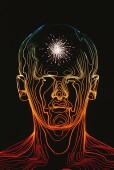- Could Your Grocery Store Meat Be Causing Recurring UTIs?
- Are You Making This Expensive Thermostat Error This Winter?
- Recognizing the Signs of Hypothyroidism
- 10 Strategies to Overcome Insomnia
- Could Artificial Sweeteners Be Aging the Brain Faster?
- Techniques for Soothing Your Nervous System
- Does the Water in Your House Smell Funny? Here’s Why
- Can a Daily Dose of Apple Cider Vinegar Actually Aid Weight Loss?
- 6 Health Beverages That Can Actually Spike Your Blood Sugar
- Treatment Options for Social Anxiety Disorder
Scientists Find Differences in Brains of Those With Dyslexia


Researchers have discovered that people with dyslexia have disrupted network connections in their brains.
Dyslexia — the most commonly diagnosed learning disorder in the United States — causes problems with reading and writing.
Previous research showed that brain activity is disrupted in people with dyslexia, but most of those studies focused only on a small number of brain regions.
This new study used functional MRI to analyze how multiple brain regions use networks to communicate with each other, something called functional connectivity.
The researchers scanned and compared the brains of children and adults with and without dyslexia, and found that the two groups had many differences in the connections between different brain regions.
People with dyslexia had less connectivity between a number of brain regions involved in reading, according to the study released online Aug. 28 in the journal Biological Psychiatry.
“As far as we know, this is one of the first studies of dyslexia to examine differences in functional connectivity across the whole brain, shedding light on the brain networks that crucially support the complex task of reading,” study author Emily Finn, a neuroscience Ph.D. student at Yale University School of Medicine, said in a journal news release.
“Compared to typical readers, dyslexics had weaker connections between areas that process visual information and areas that control attention, suggesting that individuals with dyslexia are less able to focus on printed words,” she explained.
More information
The U.S. National Institute of Neurological Disorders and Stroke has more about dyslexia.
Source: HealthDay
Copyright © 2026 HealthDay. All rights reserved.










